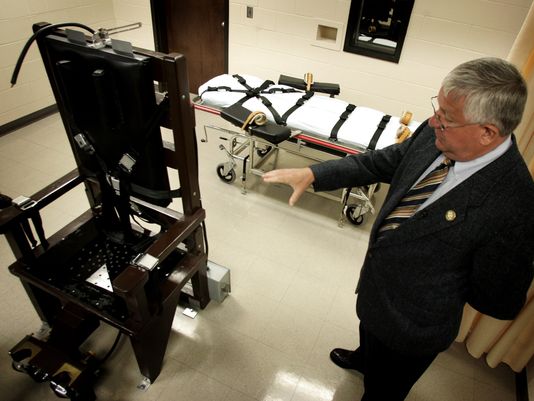Tenn. inmates sue to stop electric chair ‘torture’
 A group of 10 death row inmates suing over lethal injection in Tennessee argued on Friday that the state’s backup plan — the electric chair — is an unconstitutional “torture device.”
A group of 10 death row inmates suing over lethal injection in Tennessee argued on Friday that the state’s backup plan — the electric chair — is an unconstitutional “torture device.”
The inmates are locked in a battle with the state over whether they have a right to know how they will be killed and who will do the killing. Their lawsuit stems from a 2013 law that makes nearly all information about lethal injection secret. Friday’s amended lawsuit targets a 2014 law Gov. Bill Haslam signed that makes the electric chair the state’s official backup if lethal injection is declared unconstitutional or if the necessary drugs are unavailable.
Attorneys for the inmates say that no other state — or any government in the world — imposes electrocution on the condemned.
“The state of Tennessee stands alone as the only jurisdiction in the world to involuntarily impose the electric chair on its condemned citizens,” said Kelley Henry, a federal public defender involved in the lawsuit. “Today, on behalf of our clients who face imminent execution, we have asked the Chancery Court to allow us to challenge the electric chair as a method of execution because even when the chair works exactly as it is intended, it is a torture device.”
The lawsuit says the electric chair amounts to “cruel and unusual punishment,” which is outlawed by the U.S. Constitution.
The Tennessee Attorney General’s Office, which is defending the state in the lawsuit, had only just received the amended lawsuit and was reviewing it, said spokeswoman Sharon Curtis-Flair. In March, the attorney general released an opinion saying that the new statute would be defensible to constitutional challenges.
The death penalty has been under intense scrutiny in recent months over a series of botched lethal injection executions in which inmates lingered far longer than expected — in some cases writhing and gasping as they slowly died. The botched executions have drawn accusations that even lethal injection, once thought to be a humane method of execution, may be cruel and unusual punishment.
Tennessee executed Cecil Johnson in 2009 by lethal injection. The last time someone was executed by electric chair was in in 2007. That year, Daryl Holton was electrocuted for murdering his three sons and a stepdaughter in 1997 in Shelbyville. Under the prior law, Holton was given the choice of lethal injection or electrocution.
Friday’s lawsuit describes how Holton died, according to those who witnessed it.
“A loud bang sounded, Holton’s body jerked violently upward and remained there. The black shroud fluttered and witnesses may have heard Holton sigh. Holton’s hands gripped the electric chair’s arms tightly and turned red. After approximately 20 seconds, Holton’s body slumped over,” the lawsuit said. “Approximately 15 seconds later, a loud bang sounded, and Holton’s body jerked higher than it jerked the first time. Holton’s hands continued to grip the electric chair, and they turned bright red. After approximately 15 seconds, Holton’s body slumped.”
The suit said an autopsy found extensive burning on Holton’s body.
Attorneys for the condemned argue that the electric chair doesn’t render inmates like Holton unconscious, meaning they feel the effects of the electrocution. They say the electric chair “cooks” an inmate’s internal organs and that they may catch fire while fully conscious.
At least 11 inmates are currently scheduled to die through 2016, though the lawsuit is likely to delay those executions. Billy Ray Irick, who raped and murdered a 7-year-old Knoxville girl in 1985, is scheduled to be executed first, on Oct. 7 of this year.



